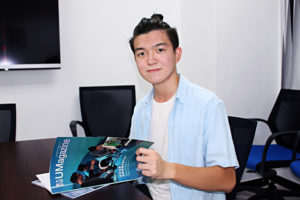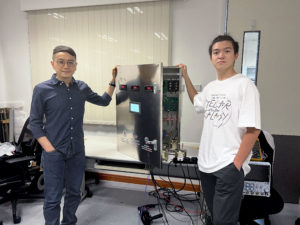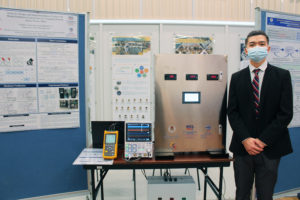Power Quality Compensators
Chan Pak Ian is an 2021/2022 outstanding undergraduate graduate of the Department of Electrical and Computer Engineering (ECE) of FST. He won “The Best Final Year Project Award” for his research about practical application of new quality compensation device with advanced control which funded by FDCT. Chan Pak Ian explained that in the development of modern cities, the number of factories and commercial buildings is growing rapidly, and some power quality problems are getting more serious, such as lower grid power factor and higher current harmonic distortion, which can lead to economic losses. Therefore, some scholars developed different power quality compensators to solve the above problems, and the LC-coupling hybrid active power filter (LC-HAPF) among them is more cost-effective and easier to control when operating in low-voltage distribution grids. Because LC-HAPF requires a current controller to operate, this project proposes an Improved Model Predictive control for LC-HAPF to achieve excellent power quality compensation performance. Chan Pak Ian also built an actual LC-HAPF experimental platform to more accurately study signal conditioning and signal sampling in practical applications. In addition, the project provides experimental verification of the relevant controllers.
Work hard and won various scholarships
Chan Pak Ian shared that he did not focus too much on study when he was a child, but he got to catch up when he was in secondary school. Fortunately, he discovered his interest in Electrical and Computer Engineering and was successfully become UM student through the admission exam. His talent was discovered by Prof Lam Chi Seng, associate professor of the Department of ECE, and was invited to join the integrated power research team at the State Key Laboratory of Analog and Mixed-Signal VLSI (SKL-AMSV). In the past 4 years, Chan Pak Ian has won various scholarships for four consecutive years and has published 4 academic papers, 2 of them were published in SCI Q1 academic journals. “Studying engineering itself is practical. Fortunately, FST has multiple laboratories and state key laboratory has a lot of latest equipment, which can improve students’ practical skills,” he said.
Aims for PhD
In regards of winning the best final year project award, Chan Pak Ian shared that it was only because he did scientific research work one step ahead of other students. He also encouraged other younger students who are interested in continuing their studies should take the initiative to contact professors in university and work hard for the publication of academic papers. Chan Pak Ian has successfully applied for direct doctoral study and achieved a PhD studentship by UM. A phrase strongly agreed by Chan Pak Ian is that “The harder you work, the luckier you get”. He fully realizes that he has to lead his own life after spending 4 years at UM. In the future, he will continue to be down-to-earth, step out of his comfort zone and keep on exploring much more possibilities.
電能質量問題
陳泊仁是本學年電機及電腦工程系優秀本科畢業生,憑藉研究澳門科學技術發展基金資助的科研課題︰先進控制的新一代電流質量補償裝置的實際應用,奪得「最優秀畢業設計項目獎」。陳泊仁解釋在現代城市發展中,工廠和商業樓宇的數量正快速增長中,以致部分電能質量問題更加嚴重,如電網功率因數變低及電流諧波失真增大,從而招致經濟損失。因此早期的學者們研發了不同的電能質量補償器來解決上述問題,而其中的LC-HAPF 在低壓配電電網運作時,有更高的成本效益以及更容易被控制。又因為LC耦合混合有源電力濾波器(LC-coupling hybrid active power filter, LC-HAPF) 需要電流控制器才能運作,所以此項目提出了用於LC-HAPF 的進階模型預測(Improved Model Predictive) 控制器以實現卓越的電能質量補償表現。陳泊仁更搭建了一個實際的LC-HAPF實驗平台,以更準確地研究實際應用中訊號調理及訊號採樣。此外,項目更提供了相關控制器的實驗驗證。
急起直追, 連續四年獲獎學金
陳泊仁坦言自己小時候沒有很認真讀書,高中時才急起直追,最終找到自己在電子及電機的興趣並成功考入澳大。大學生涯中,陳泊仁被電機及電腦工程系副教授林智聲主動邀請加入在模擬與混合信號超大規模集成電路國家重點實驗室的集成電力研究團隊,並連續四年獲各項獎學金,後來更發表過3篇學術論文,當中2篇獲刊登在SCI Q1學術期刊上,而且他亦參與了團隊將新一代電流質量補償裝置的研究成果實際應用到澳門自來水公司中的項目,為其實現節能減排。他說: 「 讀工程比較重視實際操作的技能,幸好科技學院有多個實驗室和國家重點實驗室有很多設備,可以提升實際操作能力。」
越努力越幸運
對於獲得最佳優秀作品項目獎,陳泊仁謙虛地表示只是因為自己比其他學生早一步做科研工作。另外,他也鼓勵有志繼續深造的學弟妹,可以大學時主動接觸教授,爭取協助科研工作及發表論文。現時陳泊仁已成功申請直讀博士,並獲澳大博士助學金。陳泊仁十分認同「越努力越幸運」這句話,大學4年歷練令自己明白到需要主導自己的人生,未來將繼續腳踏實地,走出舒適圈,探索更多可能。
Chan Pak Ian 陳泊仁
Chan Pak Ian and his supervisor
Prof Lam Chi Seng
陳泊仁及其指導老師林智聲教授




